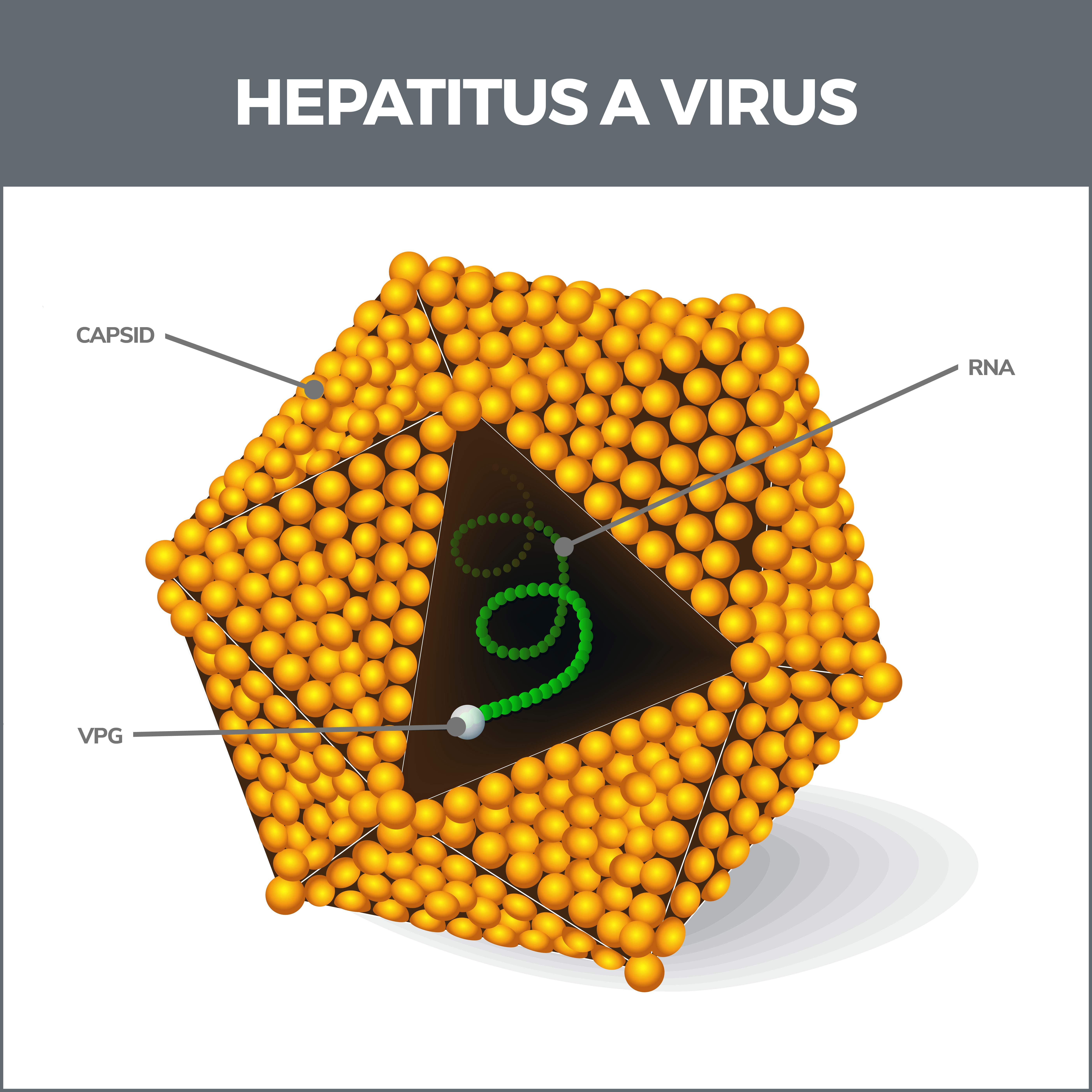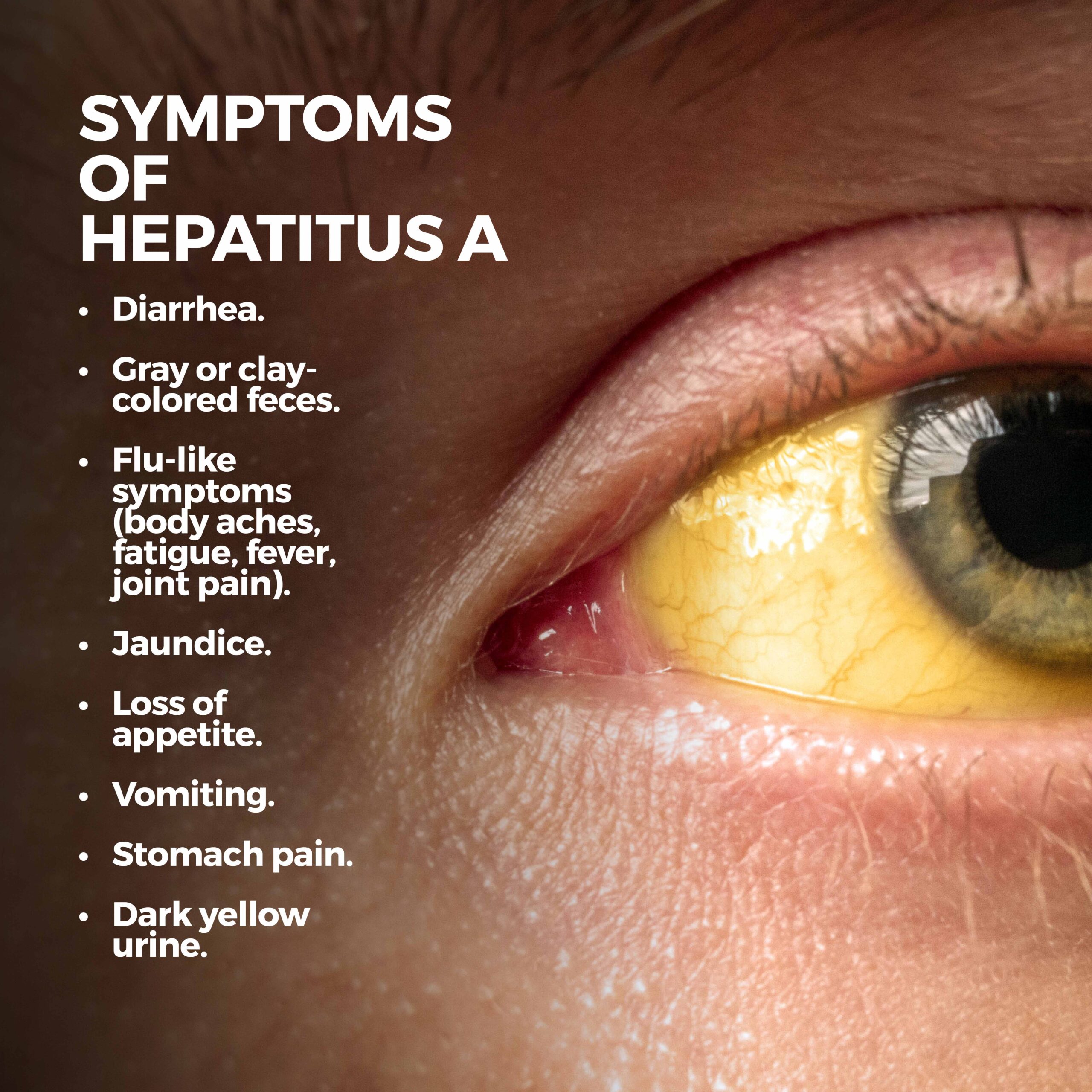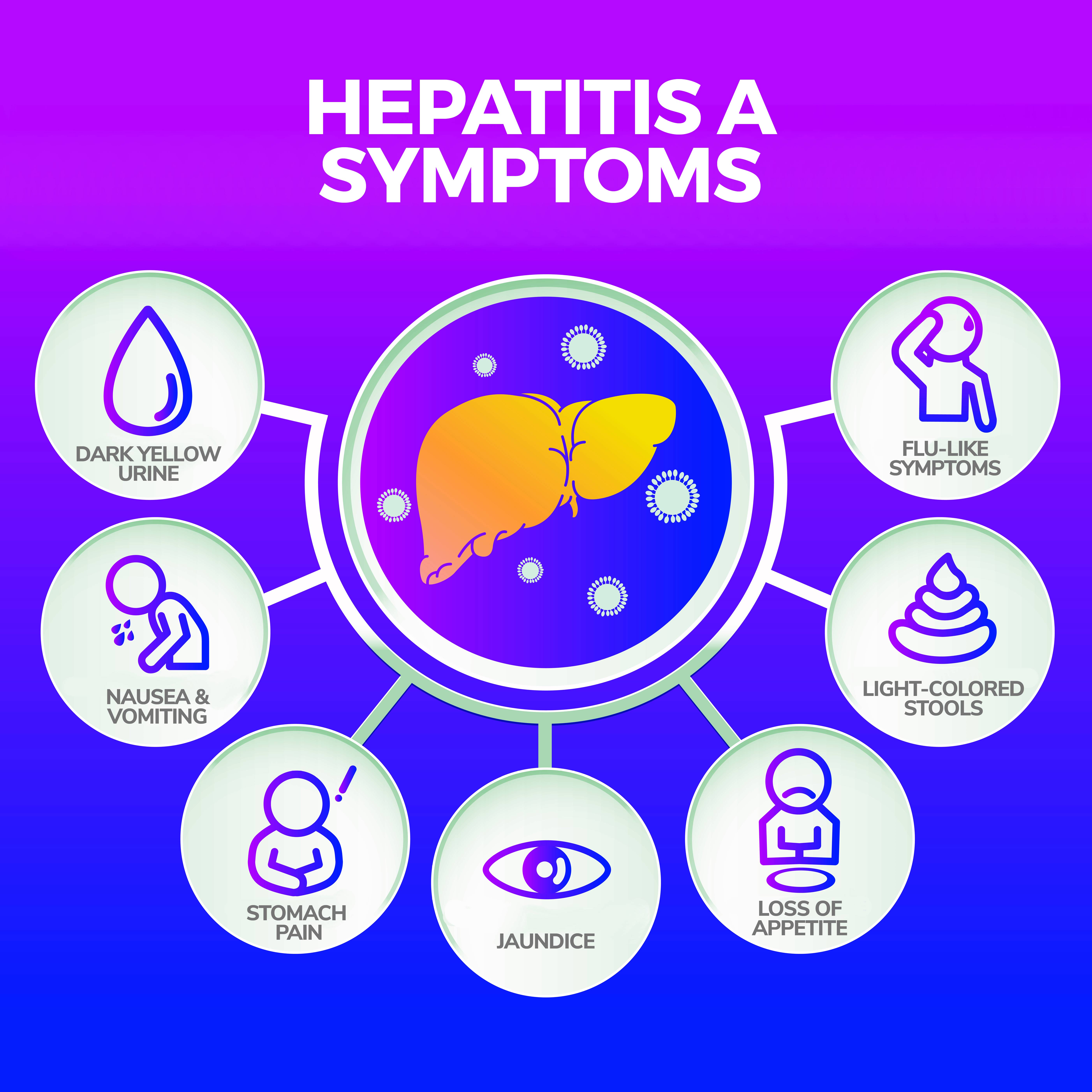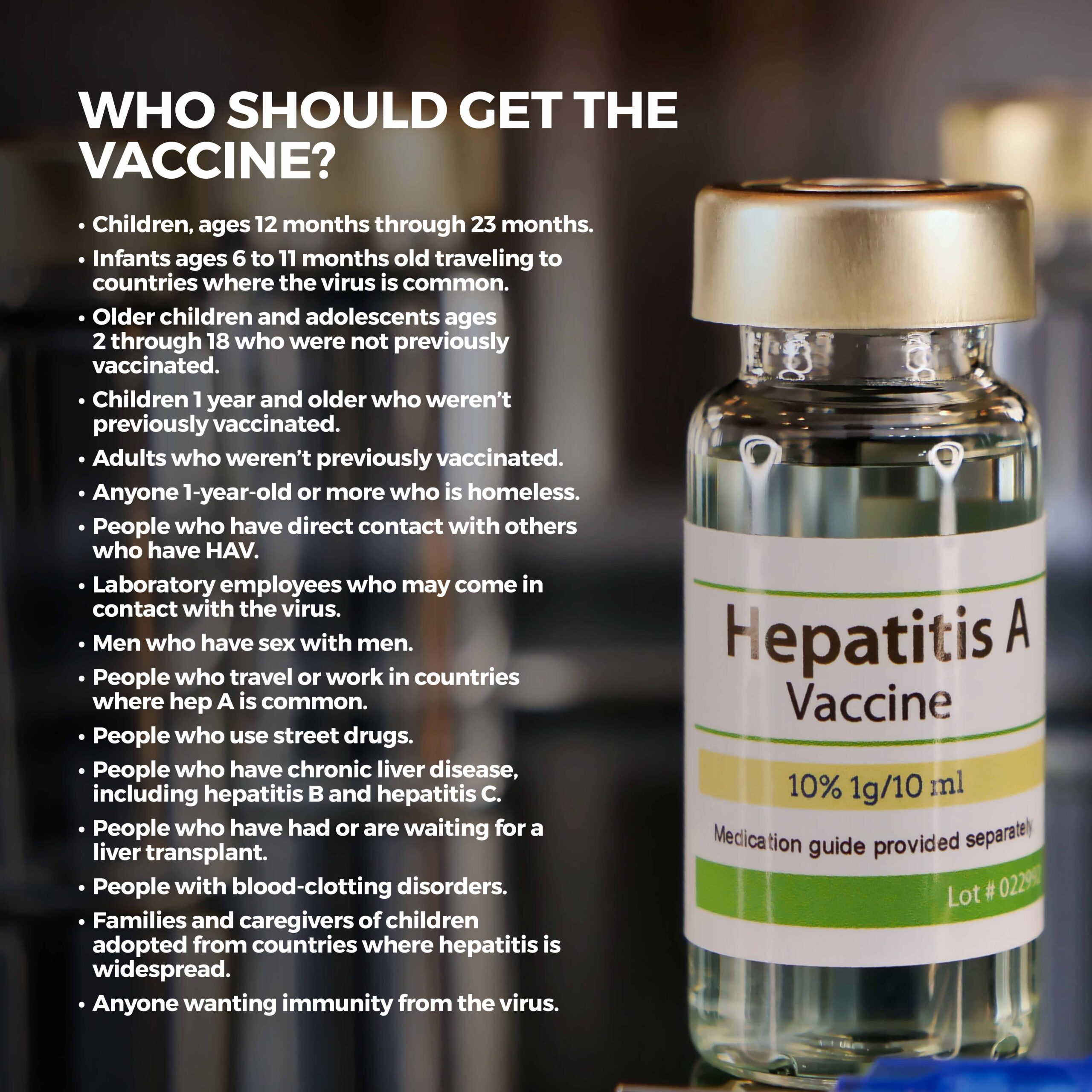
Hepatitis A
Hepatitis A (HAV) is a highly contagious liver infection caused by the hepatitis A virus. Viruses are tiny organisms that infect cells and cause diseases. Hepatitis A is so contagious that it used to be called infectious hepatitis. Hepatitis A is spread via contaminated water or food or through close contact with another person who is infected. It is a short-term (acute) condition, and most people can completely recuperate in several weeks with no long-term (chronic) liver damage. Hepatitis A doesn’t have long-term complications such as cirrhosis because the infection is so short-lived.
How Do You Get Hepatitis A?
The hepatitis A virus commonly spreads through what is called the “fecal-oral” route. You can catch hepatitis A from eating or drinking something that contains contaminated fecal matter from an infected person. This can also happen if you touch an object contaminated with hepatitis A and then touch your mouth.
The virus can live on surfaces for several months.
You can also catch HAV if you:
- Eat food prepared by someone who has hep A.
- Eat raw shellfish contaminated by sewage.
- Eat foods rinsed with contaminated water, such as fruits and vegetables.
- Have sex with someone with the virus (even if you use condoms).
- Eat food prepared by someone who doesn’t wash their hands after using the toilet.
- Touch your mouth after touching a contaminated surface.
- Drink contaminated water and ice.
- Travel to developing countries where HAV is common.
- Have clotting conditions such as hemophilia.
- Have close contact with someone with hepatitis A, even if they don’t have symptoms.
- Use recreational drugs (not just injectibles).
You have a higher risk of getting a more serious hepatitis A infection if you also have hepatitis B, hepatitis C or HIV.
There are some fallacies about how you can catch HAV. You can’t catch it:
- Through breast milk.
- By sitting near someone with hepatitis A.
- By hugging someone with the virus.
- By being coughed on or sneezed on by an infected person.
Once you’ve had hepatitis A, you will not get it again.

What Are the Symptoms of Hepatitis A?
Symptoms of hepatitis A can include:
- Diarrhea.
- Gray or clay-colored feces.
- Flu-like symptoms (body aches, fatigue, fever, joint pain).
- Jaundice.
- Loss of appetite.
- Vomiting.
- Stomach pain.
- Dark yellow urine.

Some people who are infected with hepatitis A don’t have symptoms. You can spread the virus even if you don’t feel sick. You can also spread it two weeks before you develop symptoms and during the first week after they appear. If you do have symptoms, they usually start about two to seven weeks after infection.

Can I Avoid Getting Hepatitis A?
Hepatitis A is a preventable strain of hepatitis. You can avoid it by getting the hepatitis A vaccine, two injections six to twelve months apart. Get vaccinated at least two weeks before traveling to a country where HAV is common because it takes your body two weeks after the injection to become immune to the virus. If you aren’t traveling for at least a year, get both vaccines before leaving.
The Center for Disease Control (CDC) recommends the hepatitis A vaccine for:
- Children. It is recommended that children ages 12 months through 23 months old get the first dose. A second dose should be given at least 6 months after the first dose.
- Infants ages 6 to 11 months old traveling to countries where the virus is common. These children should get one dose of the vaccine and then two follow-up doses.
- Older children and adolescents ages 2 through 18 who were not previously vaccinated.
- Children 1 year and older who weren’t previously vaccinated.
- Adults who weren’t previously vaccinated.
The vaccine is also recommended for the following:
- Anyone 1-year-old or more who is homeless.
- People who have direct contact with others who have HAV.
- Laboratory employees who may come in contact with the virus.
- Men who have sex with men.
- People who travel or work in countries where hep A is common.
- People who use street drugs.
- People who have chronic liver disease, including hepatitis B and hepatitis C.
- People who have had or are waiting for a liver transplant.
- People with blood-clotting disorders.
- Families and caregivers of children adopted from countries where hepatitis is widespread.
- Anyone wanting immunity from the virus.
You can also avoid hepatitis A by:
- Eating at reputable restaurants rather than street vendors.
- Avoiding raw, sliced, or peeled vegetables and fruits when traveling. Peel all fresh vegetables and fruits yourself.
- Only drink bottled water and only use bottled water to wash produce, make ice cubes, and brush your teeth. If bottled water is unavailable, bring water to a full boil for one minute so you can use it safely.
- Avoid raw or undercooked food. Heated food should be hot to the touch and eaten immediately.
The hep A virus may also contaminate objects that are frequently touched. These include:
- Light switch plates.
- Phones.
- Doorknobs.
- Kitchen surfaces.
- Tables and chairs.
- Computer keyboards.
- Remote controls.

How Long Do Hepatitis A Vaccinations Last?
Generally, the vaccination lasts 20 to 40 years or more. Studies have indicated that even one of the two vaccinations can protect you for at least 10 years.
Will the Hepatitis A Vaccine Protect Me from Other Types of Hepatitis?
The hepatitis A vaccine will only protect you from HAV. A separate vaccine is available for hepatitis B. There is also a combination hepatitis A and hepatitis B vaccine that will safeguard you from both viruses. Currently, there is no vaccine for hepatitis C.
Risks of a Vaccine Reaction
People experience short-term redness or soreness at the injection site, headache, fever, tiredness, or loss of appetite. In more serious cases, you may faint, have ringing ears, or have vision changes. Rarely can the vaccine cause a severe allergic reaction, serious injury, or death.
How is Hepatitis A Treated?
If you haven’t gotten the vaccine, you’ll likely completely recover from HAV. In the meantime, you can take care of yourself by:
- Drinking liquids.
- Getting plenty of rest.
- Avoiding alcohol.
- Eating healthy foods.
Talk to your doctor about medications you take, including prescription and over-the-counter medicines, vitamins, supplements, or alternative medications, because they may damage your liver.
Complications of Hepatitis A
Hepatitis doesn’t become chronic, and it doesn’t cause long-term damage to your liver. In rare cases, it can cause sudden liver malfunction or death. This typically happens to people older than 50, people with weakened immune systems, and people with other chronic liver diseases. A liver transplant may be necessary for people with acute liver failure.
Can Anything Kill the HAV Virus?
Besides getting vaccinated, washing your hands is one of the most effective ways to kill the HAV virus. After using the toilet, changing diapers, and before and after touching food, wash your hands for 15 to 30 seconds (or long enough to sing “Happy Birthday twice). Use a soap that can be worked up into a foamy lather. Hand sanitizer will not kill the hepatitis A virus.
Disinfectants containing bleach can kill the virus on hard surfaces such as toilet seats. Cooking contaminated food for one minute at temperatures higher than 185 degrees Fahrenheit can also kill the virus.
You can wash your refrigerator’s inside walls and shelves, countertops, cutting boards, and utensils. Then sanitize with a mixture of one tablespoon of bleach in one gallon of hot water. Be sure to dry everything with a clean cloth or paper towel.
How is Hepatitis A Diagnosed?
Your doctor will do several simple tests to determine whether you have hepatitis A. If you have hepatitis A, your blood may contain higher than normal levels of certain enzymes. Your doctor will check these levels with a blood test called a liver function test (LFT). After reviewing these levels, your doctor will do more tests to look for the following:
- IgM (immunoglobulin M) antibodies – Your body makes IgM antibodies during your first exposure to hepatitis A. They remain in your body for about three to six months.
- IgG (immunoglobulin G) – These antibodies protect you from hepatitis A. They are released after HAV has been in your body for a while and may stay in your body your whole life. If you test positive for IgG antibodies but not for IgM antibodies, this indicates that you’ve been vaccinated against hepatitis A or have had hepatitis A in the past.
Contact Us
If you think you have hepatitis A or HAV symptoms, getting treatment as soon as possible is important. Contact us today! The team of professionals at GastroMD looks forward to working with you. We are one of the leading gastroenterology practices in Tampa Bay. We perform a host of diagnostic procedures using state-of-the-art equipment in a friendly, comfortable, and inviting atmosphere where patient care is always a top priority!



